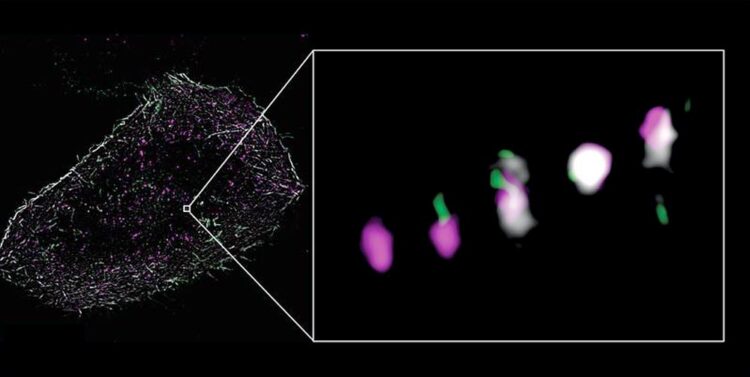Actin affects the spread of cancer in several ways

Super-resolution microscopy image of a cell. With fluorescent markers the prometastatic factor ANGPTL4 is labelled in magenta, the molecule FMNL2 in green, and the actin cell skeleton in white. The blow-up shows a single vesicle containing ANGPTL4 at several consecutive time points. FMNL2 (green) induces the polymerization of actin filaments (white) at the vesicle, propelling it forward. The vesicle itself is only about 200 nanometers in diameter.
Credit: Dennis Frank / University of Freiburg
Metastases occur when cancer cells leave a primary tumor and spread throughout the body. For this, they have to break connections with neighboring cells and migrate to other tissues. Both processes are promoted by signalling molecules released by the cancer cells, which thereby increase the malignancy of tumors. A research team led by Prof. Dr. Robert Grosse and Dr. Carsten Schwan from the University of Freiburg found that the release of these so-called prometastatic factors is influenced by the cells’ skeleton. The study was published in Advanced Science.
Actin has several functions in cancer propagation
Actin filaments are part of the cell skeleton and essential for stability and motility. They form a network that dynamically builds up and gets broken down by the addition or detachment of building blocks at the filaments’ ends. These processes are precisely regulated by other molecules, such as so-called formins. The dynamics of the actin-network enable the locomotion of cells, for example during development or wound closure, but also that of spreading cancer cells. Actin also plays a role in the transport of substances within the cell. However, this is less well understood than that of other intracellular transport mechanisms.
The Freiburg researchers now found that the actin-network also enables the release of prometastatic factors. For their study, they used high-resolution microscopy to track the movement of individual transport vesicles within living cancer cells. “We observed that ANGPTL4-loaded vesicles are conveyed to the periphery of the cell by means of dynamic and localized polymerization of actin filaments,” says Grosse, who is a member of the Cluster of Excellence CIBSS – Centre for Integrative Biological Signalling Studies at the University of Freiburg. ANGPTL4 is an important prometastatic factor that promotes the formation of metastases in various types of cancer.
FMNL2 controls the transport of ANGPTL4 along actin filaments
Based on the microscopic observations and genetic analyses, the scientists conclude that the vesicles’ movement is controlled by the formin-like molecule FMNL2 by initiating polymerization – i.e. elongation – of actin filaments directly at the vesicle. “We already knew that increased FMNL2 activity has prometastatic effects in many types of tumors,” says Grosse. “In our current work we could now demonstrate an important underlying process and a connection to the TGFbeta signalling pathway.” According to the scientist, this knowledge could be used for tumor diagnostics or therapy. for example, by developing an antibody that indicates the presence of active FMNL2 or pharmacologically targets active, phosphorylated FMNL2.
About the Cluster of Excellence CIBSS
The Cluster of Excellence CIBSS – Centre for Integrative Biological Signalling Studies has the goal of gaining a comprehensive understanding of biological signaling processes across scales – from interactions between individual molecules and cells to processes in organs and entire organisms. Researchers use the knowledge thus gained to develop strategies for controlling signals in a targeted manner. These technologies enable them not only to gain insights in research but also to develop innovations in medicine and plant sciences.
Videos: Dennis Frank / University of Freiburg CC BY 4.0
https://arpasset2.pubmate.in/ADVS_EV_ADVS202204896_20230105183943326/ProofLink/supinfo/advs202204896-sup-0002-VideoS1.mp4
https://arpasset2.pubmate.in/ADVS_EV_ADVS202204896_20230105183943326/ProofLink/supinfo/advs202204896-sup-0006-VideoS3.mp4
Factual overview:
- Original publication: Frank, D., Moussie, J.C., Ulferts, S., Lorenzen, L., Schwan, C., Grosse, R. (2023): Vesicle-Associated Actin Assembly by Formins Promotes TGFß-Induced ANGPTL4 Trafficking, Secretion and Cell Invasion. In Advanced Science. https://doi.org/10.1002/advs.202204896
- Robert Grosse is Professor for Pharmacology and Toxicology and Director of the Department I, Institute of Experimental and Clinical Pharmacology and Toxicology at the University of Freiburg. His research focuses on the regulation of the actin cytoskeleton and its role in health and disease.
- Carsten Schwan is a group leader at the Institute of Experimental and Clinical Pharmacology and Toxicology of the Faculty of Medicine at the University of Freiburg. His research focuses on the cytoskeleton.
- The study was funded by the German Research Foundation (Deutsche Forschungsgemeinschaft; DFG).
Contact:
Annette Kollefrath-Persch
Office of University and Science Communications
University of Freiburg
Tel.: 0761/203-8909
e-mail: annette.persch@zv.uni-freiburg.de
DOI: 10.1002/advs.202204896
Media Contact
Rimma Gerenstein
University of Freiburg
info@pr.uni-freiburg.de
Office: 761-203-4302
Media Contact
All latest news from the category: Life Sciences and Chemistry
Articles and reports from the Life Sciences and chemistry area deal with applied and basic research into modern biology, chemistry and human medicine.
Valuable information can be found on a range of life sciences fields including bacteriology, biochemistry, bionics, bioinformatics, biophysics, biotechnology, genetics, geobotany, human biology, marine biology, microbiology, molecular biology, cellular biology, zoology, bioinorganic chemistry, microchemistry and environmental chemistry.
Newest articles

Innovative 3D printed scaffolds offer new hope for bone healing
Researchers at the Institute for Bioengineering of Catalonia have developed novel 3D printed PLA-CaP scaffolds that promote blood vessel formation, ensuring better healing and regeneration of bone tissue. Bone is…

The surprising role of gut infection in Alzheimer’s disease
ASU- and Banner Alzheimer’s Institute-led study implicates link between a common virus and the disease, which travels from the gut to the brain and may be a target for antiviral…

Molecular gardening: New enzymes discovered for protein modification pruning
How deubiquitinases USP53 and USP54 cleave long polyubiquitin chains and how the former is linked to liver disease in children. Deubiquitinases (DUBs) are enzymes used by cells to trim protein…



